#as inspired by the part in granada hound of baskervilles
Explore tagged Tumblr posts
Text


ol Maxwell "15 cigars at once" Carter. and wilson who happens to like breathing, actually.
#dst#don't starve#dont starve#dont starve together#my thing#wilson dst#wilson p. higgsbury#maxwell dst#ds maxwell#as inspired by the part in granada hound of baskervilles#where watson coughs walking in to holmes indoor smoking no open windows. and holmes still smoking says oh are you getting a cold watson.
131 notes
·
View notes
Text
Granada Holmes (series review)
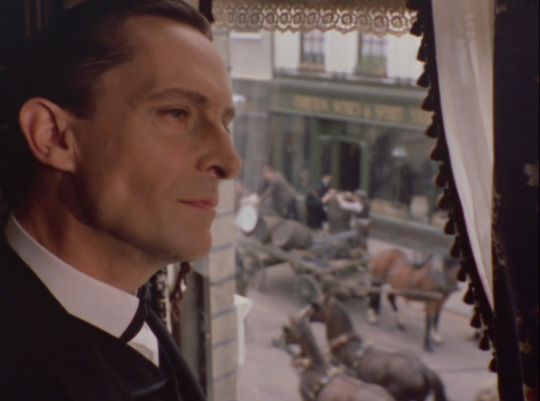
The 1984-1994 Granada series of Sherlock Holmes adaptations, starring Jeremy Brett as Holmes are regarded by fans as a milestone among the many adaptations of Sherlock Holmes that were made. Brett is said to be “the definitive Holmes”. And I would largely agree with that, despite it not being my favourite version, and it having some flaws and weak episodes, especially as the series went on.
The first thing that set this show apart is that it went back to the original stories and adapted those. Now, it isn’t the first version to do so, as some people (including Brett, apparently) claim. The 1920s silent film series with Eille Norwood was fairly canon accurate, and the 1960s BBC tv series with Douglas Wilmer and Peter Cushing also followed the canon. There is also the 1979-1986 Soviet Russian series with Vasily Livanov. And on radio you have more canonical dramatizations, such as the British John Gielgud 1950s series and the BBC Carleton Hobbs series from the 50s and 60s. People have an unfortunate tendency to ignore radio in favour of screen adaptations.
Still, it must be granted that Granada at its best is probably the supreme screen adaptation of the canon. The production values and acting are far superior to what the 60s BBC tv series had.
Jeremy Brett was a revolution in Holmes performances. The previous era defining Holmes, Basil Rathbone, as great as he was, made Holmes into too much of a straightforward hero. Brett brought back the eccentricities (including the drug use), the nervous energy and the character’s general moodiness and emotionality that was there in the text.
Holmes in the Granada series was ultimately on the side of good and a benevolent figure (if occasionally rude), but fictional justice perhaps had never an odder champion. He did everything from sitting weirdly, jumping over couches to taking drugs. Holmes felt neurodiverse, and indeed Brett used his own experiences with bipolar disorder in the performance. And it was true to canon, in a way we seldom had seen on screen before.
Jeremy Brett’s performance as Holmes is extremely influential and often imitated by later screen adaptations, but has never been surpassed. The portrayal of Holmes in BBC Sherlock and the movies with Robert Downey Jr. is clearly inspired by Brett’s nervy eccentric genius Holmes, but ends up a bad parody. Holmes in the Granada series can like his canon counterpart occasionally be rude or careless towards other, but it was lapses, not a general trend. They seemed to be caused by an eccentric brain on another wavelength from the people around him, rather than any malevolence. Holmes in BBC Sherlock is a male nerd wish-fulfilment fantasy, where the character’s eccentric genius are allowed to excuse any crimes.
At its height, Brett’s Holmes is an awe-inspiring performance, with the actor pouring everything of his skill and energy into it. You could criticize it as melodramatic over-acting, but it makes for great viewing and fits the man who said “I never can resist a touch of the dramatic”.
The Granada series gets much credit for rehabilitating the role of Watson. Both of the actors playing him depicted as very much intelligent and capable. It is somewhat overstated of course, the turning away from the comedic figure Nigel Bruce portrayed started already with Andre Morell’s Watson in the 1959 Hammer Hound of the Baskervilles. Still, the Watson depicted by the Granada series is still one of the show’s chief draws.
The series had a switch in the actors playing Watson, with David Burke portraying him in the first two seasons of 13 episodes and The Empty House featuring Holmes return to a Watson portrayed by Edward Hardwicke. And honestly it is hard to choose between them, because they are both great and there is a consistency in the writing that makes them feel like the same basic character.
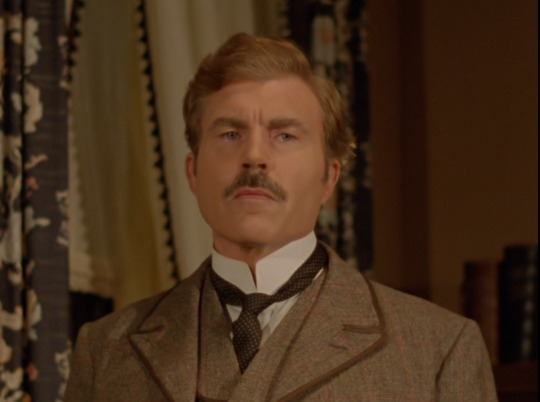
Burke’s Watson comes across as younger and more energetic of the two actors and has perhaps the better comedic dynamic with Holmes. He is perhaps my pick, as despite his actual age while playing the part, he feels closer to the young Watson of the canon.
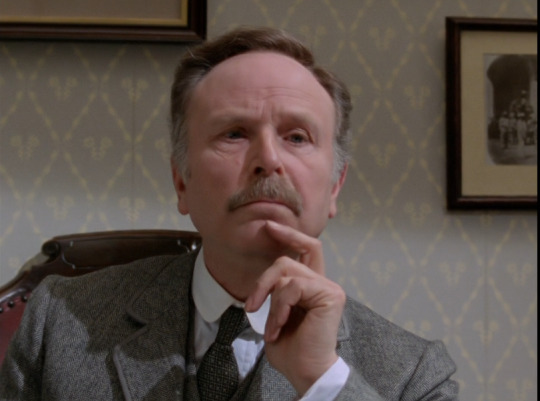
But that is no serious slight against Hardwicke’s performance, which is still first-rate. Hardwicke’s Watson feels older, despite the difference in age between the actors being but a few years. The performance is also defined by an effortless charm and warmth, giving Watson an avuncular aura. But Watson is not at all infirm and is still an intelligent medical man and an experienced soldier, ever ready with his revolver.
An interesting change from the Canonical stories is that Watson never gets married and moves out of Baker Street. The Sign of the Four features Mary Morstan, but at the end she walks out of the story without any romance between her and Doctor Watson. The reason this was done, is that it simplifies the set-up of the stories. With Watson in 221B, he is always on hand to join Holmes. No need for a scene at the beginning of Holmes taking Watson away from wife and practice. Also it saves them keeping track of when Watson was married or not, something that Conan Doyle himself got into a serious continuity tangle about.
As producer Michael Cox (quoted in David Stuart Davies’s book Starring Sherlock Holmes) noted, Conan Doyle himself probably regretted marrying off Watson, considering The Empty House has Watson suffering from a “sad bereavement” and then moving back in with Holmes. So it is a very much acceptable deviation from canon.
It also frees the writers to focus on the most important relationship in the canon: the friendship between Holmes and Watson. The canon has been called “a textbook of friendship” by Christopher Morley, and the chemistry and relationship between Holmes and Watson is vitally important to any adaptation. And that aspect of the stories is wonderfully conveyed here, with both actors playing Watson working together with Brett as Holmes well to convey the odd but close friendship between the two men.
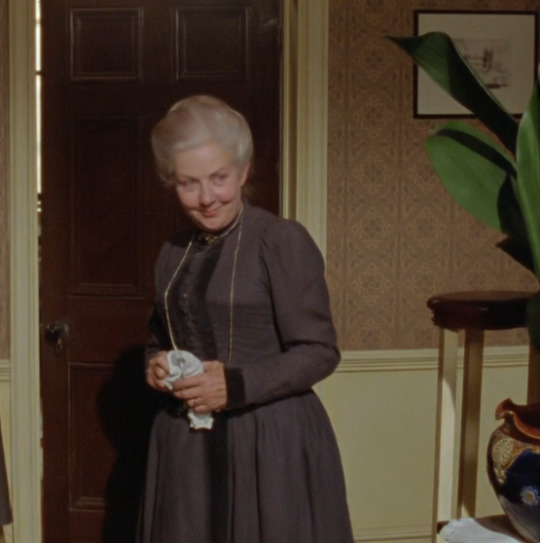
Rosalie Williams plays Mrs. Hudson, and she is excellent in the role. The Granada series has a lot of little scenes of Mrs. Hudson added into the canonical cases, and they work excellently, giving her more of a presence. Many of them are comedic, making jokes about how a difficult and eccentric lodger Holmes is, but there is a clear undercurrent of affection throughout their interactions.
The recurring cast members include Charles Gray as Mycroft Holmes and Colin Jeavons as Inspector Lestrade.
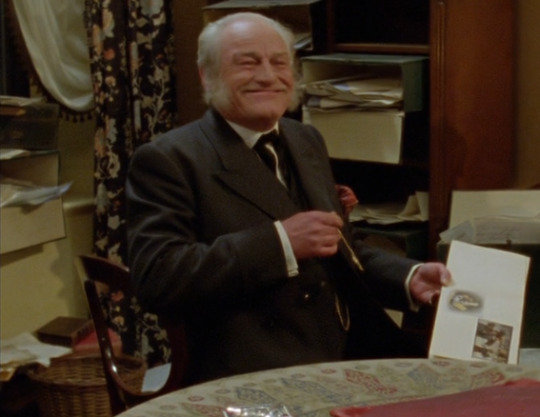
Gray as Mycroft is close to ideal, fitting the character of the overweight, lazy and intelligent canon character perfectly. He was such a good fit for the role that he had actually earlier played the part in the film adaptation of The Seven-Per-Cent Solution.
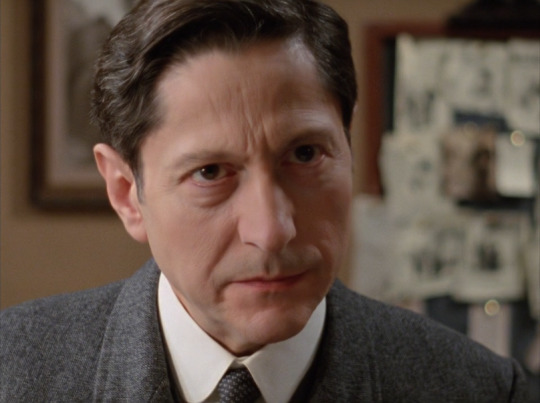
Jeavons fit the part of Lestrade and his acting is superb, capable of showing the full extent of Lestrade’s character, having both smug over-confidence at times, yet also having genuine respect and affection for Holmes.
The acting skills of the actors playing characters who only appear in one episode is also generally very high. And that is part of the general high quality of execution the show had for most of its run. The period sets and the directing was of a similar high standard. The music by Patrick Gowers is excellent, and I suggest any fan take a listen to this Youtube playlist of his soundtrack.
The scripts are quite excellent, for the most part sticking close to the Conan Doyle stories. Of course there are always infidelities here and there, and sometimes the episode would go on non-canonical tangents.
Usually it was to make the story work better on screen. For example, the villains in The Greek Interpreter escape from Holmes and Watson, ending up being killed “off-screen” as it were. So the Granada version of the same tale has a non-canonical ending of Holmes, Watson and Mycroft confronting the villains on a train, something that works rather well. Another example is The Musgrave Ritual which entirely ditches the original story’s framing device of Holmes telling Watson the story of an early case of his. In the Granada version Watson is with Holmes on this case, and it works better that way.
And with all of these elements working together, for most of its run, the Granada series is perhaps the definitive screen adaptation of Sherlock Holmes. The first four seasons of 50 minute episodes, which were broadcast under the titles of The Adventures of Sherlock Holmes and The Return of Sherlock Holmes from 1984-1988 plus the feature length adaptation of The Sign of Four are pretty much all great. It went from strength to strength, consistently making very well-made adaptations of the canon.
The Sign of Four is probably a good pick for Granada’s peak, due to its epic nature. And it is definitely the best of the five feature-length films they did. Outside of leaving out any romance between John and Mary, the film is faithful to the book, although it goes too far in that direction in keeping in the racism of the story. But it also has all of the book’s virtues as a story too, and fine acting from Brett, Hardwicke, and John Thaw as Jonathan Small make for an enjoyable viewing experience.
There was however a decline in the series later years. The lynchpin of the series was Jeremy Brett, and his health began to seriously fail him by 1987, leading to his death in 199 (my source of information on Brett’s health decline and general behind the scenes things is mostly Davies’s book Starring Sherlock Holmes) Once lean and looking remarkably like the Sidney Paget illustrations of Holmes, his conflicting medications for his heart problems and bipolar disorder caused him to retain water and bloat, causing him to no longer look like the lean figure he once was. His looks wasn’t really the problem, what was however was that his health problems drained him of the energy that he once was able to put it into his performance, creating through no fault of his own a more lethargic and weaker Holmes.
There was also a growing lack of care shown towards the series by Granada itself. The budgets began to shrink by 1988, and while the series looked good for the most part, it did impact the show.
Probably the first disappointing episode is the double-length adaptation of The Hound of the Baskervilles from 1988. You would expect the Granada series, with their excellent leads and excellent track record up to this point, to create the definitive version of this often-filmed story, but it just isn’t. It isn’t bad, but it is ultimately mediocre in a way that is hard to pinpoint. My guess is that the direction and cinematography doesn’t manage to create the suspense the story needs, resulting in a slow-paced and slightly boring experience.
It also ends up show-casing the problems the show would now begin to have, with the production crew not having the money to do location shooting on Dartmoor and Brett obviously showing the signs of his failing health.
The Hound film was followed by a season of six 50-minute length episodes, called The Case-book of Sherlock Holmes. And these were mostly fine, considering the circumstances. The budget had been reduced compared to earlier seasons and you could tell the writers sometimes lacked a first-rate canonical story to adapt.
There were one or two weaker episodes, but those were due to the original story being weak. For example, the season ended with a faithful adaptation of The Creeping Man and it is as good and well-made a tv adaptation you could ever hope to make with such a bizarre plot. The result is of course pure camp, but so is the original story. When the show had a good Conan Doyle story to adapt, like The Boscombe Valley Mystery, The Problem of Thor Bridge or The Illustrious Client, the results are indeed up to the standards of its past.
The real nadir of the series came later, however, when in 1992-93 the series decided to do three double-length episodes. Granada wanted the Holmes series to copy the success of Inspector Morse and its 100 minute tv film format. The problem was the show would still adapt Conan Doyle’s short stories into a format that was far too long for them. So the scriptwriters had to pad the stories out with their own inventions.
This sort of worked for the first film of these three films, The Master Blackmailer. It was based on Charles Augustus Milverton, which is one of the shortest stories in the canon, but one of the most rich in dramatic potential. Writer Jeremy Paul’s script decided to show in detail what is merely mentioned in the story, such as Milverton blackmailing people and Holmes courting Milverton’s maid in order to gain access to his home. The end result works, it is somewhat slow-paced but is ultimately coherent and at its best feels like you are watching the backstory to the canonical events.
The same can’t be said for the second and third of these films, The Last Vampyre and The Eligible Bachelor. The Last Vampyre is an almost completely incoherent non-adaptation of The Sussex Vampire, where elements from the canonical story probably make up less than 5% of the resulting film. There is an attempt to create intrigue and suspense around the original character Stockton, but the film is so vague about what he is and what threat he poses that the resulting film makes no sense.
The Eligible Bachelor is a similar adaptation of The Noble Bachelor, where the canonical story elements that remain is entirely subsided by a new bizarre plot where Lord St. Simon is now a ruthless Bluebeard-like villain. It is slightly better than The Last Vampyre, simply because the villain here poses an identifiable and somewhat coherent threat. Still, the film has to pad things out with bizarre subplots, like Holmes having prophetic dreams, which ultimately doesn’t lead anywhere.
Wisely, the series returned to the 50 minute format for the last season of six episodes, which aired in 1994, under the name of “he Memoirs of Sherlock Holmes. It was with this season Jeremy Brett’s health problems and the lower budgets really began to seriously affect the show. Brett was in a bad state at this point, and the description of the production in Davies’s book makes for sad reading.
During the filming of one episode in this season, The Three Gables, he had to use a wheelchair between takes and supplementary oxygen to ease his breathing. His performance is naturally lacking in the energy he once had, but the fact it is a performance at all is testament to his commitment. The Three Gables is actually one of the better episodes of this season, as it actually manages to improve on one of the weakest stories in the canon.
Edward Hardwicke was unavailable to film The Golden Pince-nez, and they couldn’t re-schedule the shooting dates (which I suspect was a budget issue). So the writer wrote out Watson and replaced him in the role of Sherlock’s assistant with Mycroft, since Charles Gray was available. The result is well-made otherwise, with guest stars Frank Finlay and Anna Carteret giving great performances, but the lack of Watson is sorely felt. It is fun to see Charles Gray’s Mycroft again, but it feels contrary to his character to accompany his brother like this.
And before he could film The Mazarin Stone, Brett’s health gave out on him and he was hospitalized. Again Charles Gray was called in by the producer to play Mycroft as a substitute. It is nice to see Mycroft for a fourth time, but Mycroft doing this doesn’t feel true to his character. And this episode is one of the weakest in the series, due to the script. Not that I blame the scriptwriter too much, The Mazarin Stone is one of the worst stories in the canon. The efforts to improve on the story by combining it with another weak story The Three Garridebs don’t at all manage to rescue it.
However, there are still some rather good episodes in this season . The Red Circle is good and The last ever episode of the series, The Cardboard box manages to close out the series on a good if dark note.
Jeremy Brett died in 1995 due to heart failure, ending all hope of any future series.
I might have delved too much on the series failures in this essay. Because all of that is outweighed by the consistent high quality the series managed to achieve in the first four seasons, and with a few failures, still managed to sometimes achieve again in the later ones. Those adaptations are perhaps the peak of Holmes on screen.
It is not my favourite adaptation, that is the BBC radio drama versions made starring Clive Merrison as Holmes from 1989 to 2010. Those were just as consistently good, with Merrison and Williams/Sachs as Holmes and Watson being on the same general level as Brett and Burke/Hardwicke as performances. In fact, the BBC version is more consistent, never going off the rails as the Granada version sometimes, and it actually managed to achieve the goal Brett had hoped for: adapting every canonical story.
Still that doesn’t take away from Granada’s great achievement in adapting the Holmes stories with such quality. It is an achievement that later movie and tv adaptations haven’t been able to surpass.
17 notes
·
View notes
Text
Got tagged in a “9 people you want to know better/catch up with” meme by @suzirya! (Thank you, friend!)
Last song: I was last listening to the thematically looser of my two playlists for my D&D character, so it’s Pictures on the Wall by Ira Wolf. (Emotionally it’s a pretty good one for him, but it gets relegated to the “loose” playlist due to all the real-world place names. Maybe someday I’ll write something similar with the wealth of fantasy one our massive D&D world map...)
Last movie: Depending on your definition of movie (I vote a made-for-TV one counts if it’s full-length or more), I watched the Granada Sherlock Holmes (the ones with Jeremy Brett) adaptation of The Hound of the Baskervilles with a couple friends earlier today, which was actually a perfect call for some good October spooky vibes. Called out for the fact that my favorite Holmes story is the one that’s basically a glorified Scooby-Doo episode but listen. I know who I am.
Currently watching: I don’t watch much TV, but I am frantically scrambling to catch up on two D&D streams right now, because both of the ones I keep up with (High Rollers and Critical Role) apparently just had pretty significant developments related to my favorite characters in each. Incredibly cruel of them to converge on me like this, especially with their episode length. I am Fate’s plaything.
Currently reading: The Affair of the Mysterious Letter by Alexis Hall! It’s been ages since I read much fiction but I’m trying to get back into it. Also here’s where I betray that it’s.... actually also Sherlock Holmes-inspired so I guess I’m on a kick? (Sue me, a good Holmes and Watson dynamic generally reads like platonic life partners and crave that.) That said, it uh, also takes place in a weird Victorian Lovecraftian fantasy world and the Holmes character is a sorceress, so you know. It makes the fact that the author writes a pretty decent, dry Conan Doyle impression pretty funny. I’m not very far into it but I’m liking it a lot so far! Plus I picked it up in part because the Watson-expy character is trans, and I’ve never actually consumed any fiction with a transmasc character in it before, so I’m kinda emo about that part
Currently craving: Really want some good beer cheese soup to go with the autumn vibes going on right now (even if we got snow today and are shifting into winter mode). I might have to tinker with making some again soon. It’s just so good....
I’ve had a bit of a day and am probably not going to tag folks, but please, feel free to steal this from me if you want to play along.
8 notes
·
View notes